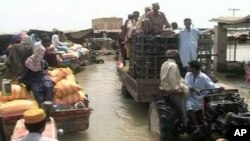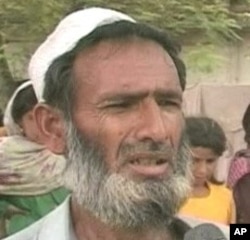Waterborne illnesses are making the flooding victims in Pakistan increasingly desperate for medical help. Health and social workers warn that if aid does not come soon, the outbreak of potentially fatal diseases is imminent. Prevention costs very little. But if these diseases do break out, cramped conditions make it possible for them to spread very quickly.
As the flood waters recede in Pakistan, the danger of infection among the flood victims rises. Experts say the camps where people have taken shelter are potential breeding grounds for malaria, cholera, and other gastrointestinal diseases.
Most people in these camps are already complaining of infections caused by contaminated water. Amanullah Khan worries about his children.
"The skin of [the] children's feet is getting infected," Khan said. "They also have upset stomachs and gastric problems. All sorts of ailments are affecting them. They are also getting eye infections."
When people with diarrhea and upset stomachs feel dehydrated, they will drink dirty water, if it's the only water available - and expose themselves to still more disease.
Dr Anthony Fauci, Director of the U.S. National Institute of Allergy and Infectious Diseases [NIAID] says contaminated water can lead to not just one, but many infections.
"You could get hepatitis, you could get e-coli, you could get salmonella, and you can get dysentery," he said. "So the possibilities of diarrheal-born diseases are enormous when you have such a catastrophe of this magnitude where you have tens of millions of people displaced in conditions where you don't have clean water."
So far more than 1,600 people have died in Pakistan and more than six million others are homeless, according to a United Nations report. The U.N. also reports more than 120,000 cases of suspected dengue fever and malaria. Millions also suffer from diarrhea, respiratory illnesses, and skin infections.
Dr Peter Hotez is an expert in tropical medicine at George Washington University. He is concerned that the intense summer heat and the lack of good hygiene create the perfect conditions for a cholera epidemic.
"The reason I am so concerned about cholera is that we know that when people are living under extreme circumstances where there are breakdowns in sanitation such as in the flood waters of Pakistan, we know that cholera can emerge in violent epidemic outbreaks," he said.
Health facilities in the camps are so thinly spread that cases of acute diarrhea are being treated as though they were cholera, just as a precaution.
Dr. Hotez warns that cholera can kill within hours by causing diarrhea-based dehydration. He says a vaccine is the cheapest way to protect a large population from this disease. But if vaccines are not available, the next best solution is to have cholera victims drink a simple solution of sugar and salt, in clean water.
"It's a very low-cost, simple life-saving technique that can prevent in some cases 90 percent of the deaths if delivered rapidly," Dr. Hotez said. "Oral rehydration, sitting and giving sips in larger quantities, and the key is to give the right amount of sugar and salt."
International agencies and local charities are providing basic medicines, such as anti-malarial tablets, antibiotics, and oral rehydration packets to avoid severe dehydration. But with millions of people still homeless, and aid agencies fear that a health crisis could still be brewing.













